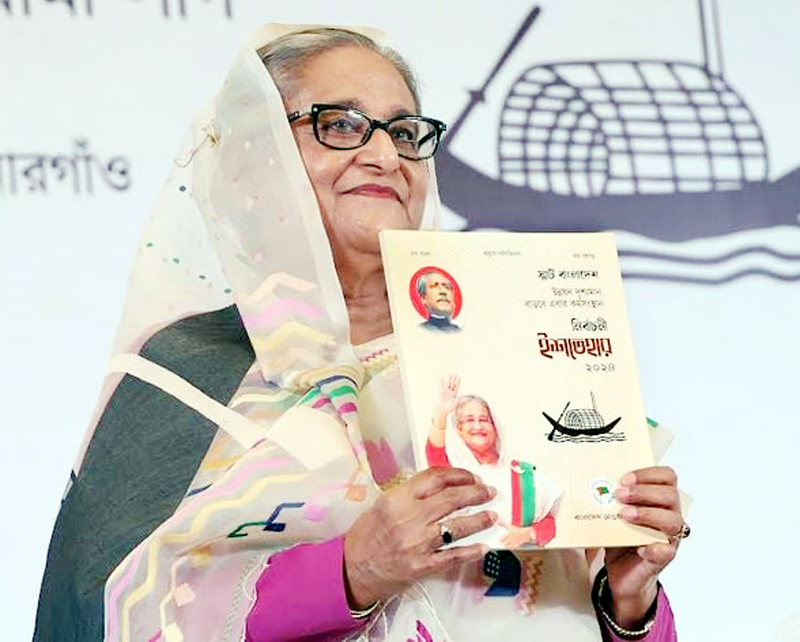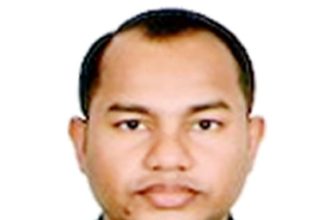DE Online Report
Sheikh Hasina on Wednesday announced her party’s polls manifesto for 2024 general election, vowing to build a developed, prosperous and Smart Bangladesh by 2041.
“Bangladesh will be established as a high-middle-income country by 2031 and a developed, prosperous, smart one by 2041 by the Bangladesh Awami League, the bearer of the spirit of the Liberation War, if the people once again allow us to serve them by voting for the Boat, the AL’s electoral symbol,” she said.
The AL chief said if the people of the country vote for the AL, her party will give them development, peace, and prosperity.
Sheikh Hasina, also the prime minister, made the remarks after unveiling her party’s election manifesto at a city hotel this morning, just 10 days before the 12th parliamentary election slated for January 7.
The slogan of the AL’s election manifesto is “Smart Bangladesh where Development Shines, Accelerating Employment” as the manifesto has given priorities to 11 issues.
In the latest election manifesto, the AL also vowed to show zero tolerance against corruption, take action against money launderers, alleviate poverty, control commodity prices, generate more employment, and ensure the rule of law and human rights.
She said that AL had always fought for the establishment of democracy, as the party was always active in ensuring people’s fundamental and democratic rights.
A functioning parliament through elections in a democratic system can protect people’s interests, she added.
Hasina highlighted the achievements of the government in various sectors, including per capita income, GDP and budget size, electricity, infrastructure, education, and the health sector.
The manifesto said that chapters to combat corruption would be included in the education curriculum.
AL has set targets to reduce the poverty rate to 11 per cent, end extreme poverty, and reduce the poverty rate to three per cent by 2041.
AL has promised to phase out rent-based and inefficient power plants if it wins again. Long-term plans have been adopted to increase power generation capacity to 40,000MW by 2030 and 60,000MW by 2041, according to the manifesto.
Import and export trade will be balanced, reducing uncertainty in the supply of foreign exchange. Laws will be strictly enforced to recover defaulted loans, it stated.
AL pledged to make arrangements so that journalists do not face torture, intimidation, or false cases. The process of forming the 10th Wage Board for journalists is underway, said the party.
AL has given special priority to 11 issues, including making all-out efforts to keep the price of commodities within the purchasing capacity of all, ensuring vocational education and employment for the youth, building a smart Bangladesh based on modern technology, and increasing investment in integrated farming, mechanisation, and processing for profitable agriculture.
The priorities also include promoting industries by taking advantage of visible infrastructure and increasing investment, increasing efficiency and capacity in the financial sector, making healthcare accessible to low-income people, including everyone in the universal pension system, preventing communalism, and protecting and promoting democratic practices at all levels.
‘Political parties always make commitments before an election. But they show little sincerity in fulfilling their promises once voted to power. It’s not just the Awami League. All parties did the same. We hope that the Awami League will keep its promise this time,’ said former cabinet secretary Ali Imam Majumder.
Political observers said that AL had failed to address the five priority issues—commodity price control, effective action against corruption, elimination of poverty and inequity, long-term policy for power and energy, and establishment of good governance—that it promised about 15 years ago in the 2008 election manifesto.
One of the most important electoral promises was to take measures to keep prices within the purchasing power of the people.
However, according to government data, the prices of essential commodities have soared by 38 to 219 per cent in the past three years alone, putting lower and lower-middle-income people under serious hardship.
The ruling party’s 2008 electoral commitment to effectively control corruption has not been fulfilled yet. Bangladesh ranked 12th on the list of the world’s most corrupt nations in the 2022 report, indicating that there had been little to no progress in reducing corruption.
The AL said that it would adopt a comprehensive, long-term policy on electricity and energy. However, according to Our World in Data, a UK-based online publication, per capita power consumption in Bangladesh is one of the lowest in South Asia.
Although Bangladesh Bureau of Statistics data showed the country’s poverty rate decreased to 18.7 per cent in 2022 from 31.5 per cent in 2010 during the incumbent government, economists said that inequality increased as development was not inclusive.
Different survey reports claimed that the number of new poor was increasing and that the poor and low-income groups had been struggling to cope with high food inflation.
While the poor continued to struggle to make ends meet, the number of people with more than one crore in bank accounts increased over the years, a clear sign of growing equality, economists said.
According to Bangladesh Bank, the number of bank accounts with over Tk 1 crore in deposits was 21,781 in June 2009. The number rose to 1,09,946 at the end of December 2022.
In its previous election manifesto, the AL also pledged to establish good governance, and freedom of expression, and protect human rights.
The United Nations, the United States, and the European Union have expressed concerns on many occasions about human rights violations time and again during the AL government’s tenure.
Different countries and international rights groups have also expressed their concerns about freedom of the press and freedom of expression.
The government enacted the Digital Security Act, 2018 allegedly to suppress dissent before the law was scrapped amid criticism from the local and international community, only to be replaced by a similar law, the Cyber Security Act, which was passed in parliament on September 13.
ELECTION MANIFESTO: Awami League pledges to build ‘Smart Bangladesh’

Leave a comment








